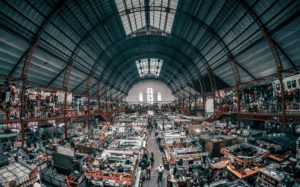
“What we need is a diverse and robust economy.” We hear this phrase or some form of it in nearly every election cycle at almost every level of government. But economic diversification is killing communities.
Think back to the founding of nearly any city in America. They usually come from a single economic boom: Gold was found; timber was rich; a port was built on the confluence of two rivers; a factory was erected. When there was a single economic driver a host of support services, companies, and businesses sprung up: banks; grocery stores; parts suppliers; barber shops, etc.
One downside was that many of the towns and cities that came out of a single economic boom, crashed at some point when the “boom” was over. The gold ran dry and towns were abandoned. A factory closed and left the townspeople destitute. Timber production moved overseas or even worse, all the trees were logged and a town slowly died.
So economists and academics decided that economic diversification was the answer. The prevalent thinking was (as the colloquialism states) not to put all of your eggs in one basket.
This kind of economic diversification works in states, super cities, and countries, but it does not work in towns and communities without millions in their population. Why?
Economic diversification in a city or town robs it of an identity. When a town just exists for many reasons the residents do not have an opportunity to take pride in the kind of town they are. Think Pittsburg. Proud steelworkers. Think Detroit, proud autoworkers. Think Los Angeles, proud makers of entertainment. What about Fairbanks, Alaska, or Poughkeepsie, New York? What are those towns known for? Giving a town a new identity creates pride and community.
Economic diversification in a city or town robs it of focus. It is human nature that if we have too many options we get paralyzed. Towns and cities focused on economic diversification are rarely doing any one thing well. They do not attract companies to relocate, they do not create new startups, and they do not create a future-proof environment where generations from now everyone has the opportunity to grow economically.
Economic diversification in a city or town robs it of the opportunity to develop talent. Because there is no sustainable industry of excellence driving demand on specific talents, most education institutions generalize their programming and areas of study. This is great for creating a generally educated population, however, it does not help the average citizen gain a job-ready skillset in order to make a livable wage. Those who are interested in a specific area of education then often leave the community in search of a city (usually a tech-driven mega city) where they can employ their skillset. It’s become known as “brain-drain.”
What we need is a new model where cities and towns can find and focus on a sustainable industry of excellence. Let’s break down the phrase “sustainable industry of excellence.”
Sustainable means that it is an industry that is growing and has a dynamic, scalable future.
Industry means that there is a focus on an entire industry not just one small part of that industry.
Excellence means that a city or town will work towards becoming the preeminent geographic center that is hyper-focused on a specific industry and developing its future.
Imagine a community where they are hyper-focused on aerospace and aviation. Kids are learning about aviation and aerospace from a VERY young age. It becomes part of their curriculum and science fairs. Local community colleges and universities can develop certification courses that give students the ability to go to work in months, not decades, and with little or no debt. Workers in the various companies already in an industry start to meet and with the right encouragement to form their own startup companies.
Economic diversification should be the focus of states or nations, not towns and smaller cities. The latter should be focused on identifying and building a branded ecosystem for an industry that will be around for the next 100 years.
